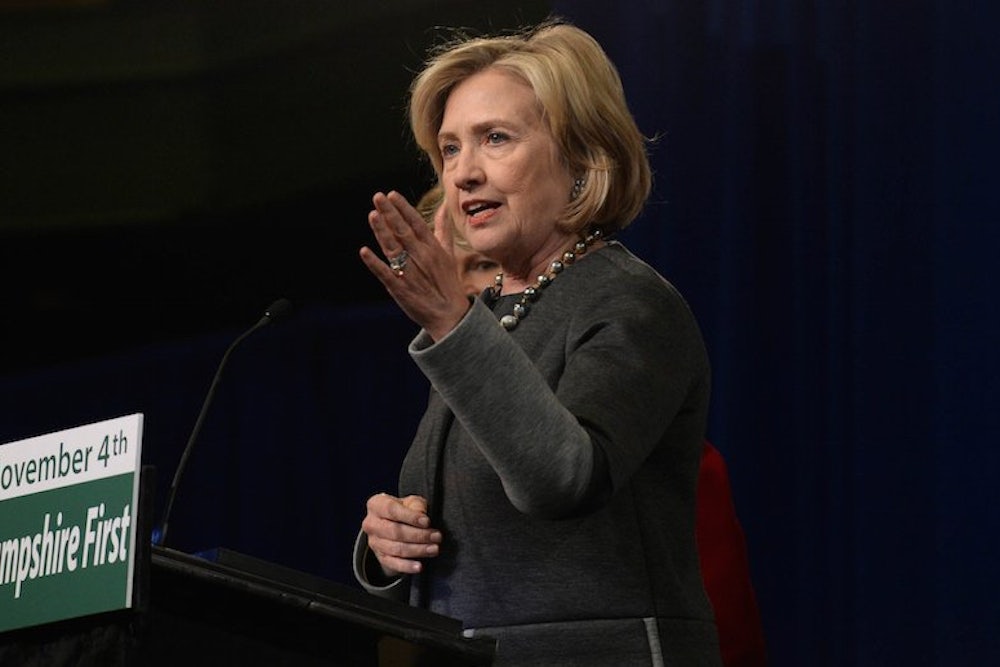Republicans did well in the midterm elections, but there is widespread agreement that they face a demographic disadvantage in the 2016 presidential election, when many of the predominately Democratic younger and minority voters, who stayed home in 2014, will return to the polls. It’s true that an expected increase in turnout will benefit the Democrats, but may not be enough to elect another Democratic president.
The chief obstacle that any Democratic nominee will face is public resistance to installing a president from the same party in the White House for three terms in a row. If you look at the presidents since World War II, when the same party occupied the White House for two terms in a row, that party’s candidate lost in the next election six out of seven times.
The one exception was George H.W. Bush's 1988 victory after two terms of Ronald Reagan, but Bush, who was seventeen points behind Democratic nominee Michael Dukakis at the Republican convention, was only able to win because his campaign manager Lee Atwater ran a brilliant campaign against an extraordinarily weak opponent. (Democrats might also insist that Al Gore really won in 2000, but even if he had, he would have done so very narrowly with unemployment at 4.0 percent.)
There are three reasons why the three-term obstacle has prevailed. The first and most obvious has been because the incumbent has become unpopular during his second term, and his unpopularity has carried over to the nominee. That was certainly the case with Harry Truman and Adlai Stevenson in 1952, Lyndon Johnson and Hubert Humphrey in 1968, Gerald Ford (who had succeeded Richard Nixon) in 1976, and George W. Bush and John McCain in 2008.
The second reason has to do with an accumulation over eight years of small or medium-sized grievances that, while not affecting the incumbent’s overall popularity, still weighed down the candidate who hoped to succeed him. Dwight Eisenhower remained highly popular in 1960, but some voters worried about repeated recessions during his presidency, or about his support for school integration; Bill Clinton remained popular, and unemployment low, in 2000, but his second term had been marred by the Monica Lewinsky scandal, and coal-state voters worried about Democrats’ support for Kyoto while white Southern voters worried about the administration’s support for African American causes.
The third reason has to do with the voters’ blaming party gridlock between the president and congress partly on the president and his party. That was a factor in 1960—James McGregor Burns was inspired to write The Deadlock of Democracy by the Eisenhower years—and it was also a factor in the 2000 elections.
In the 2016 election, not just one, but all three of these factors will be in play and will jeopardize the Democratic nominee. Obama and his administration are likely to remain unpopular among voters. There is already an accretion of grievances among Obama and the Democrats that will carry over to the nominee. These include the Affordable Care Act, which, whatever benefits it has brought to many Americans, has alienated many senior citizens (who see the bill as undermining Medicare), small business owners and employees, and union leaders and workers whose benefits will now be taxed. Add to these the grievances around the administration’s stands on coal, immigration, guns, and civil rights, including most recently its support for the protestors in Ferguson.
There are, of course, many voters who would vote for a Republican regardless of who had been in office, but there are many voters in the middle (especially in presidential years) whose vote, or failure to vote at all, will be swayed by a particular grievance. That certainly hurt Al Gore in 2000, McCain in 2008, and could hurt the Democratic nominee in 2016. It’s a very rough measure, but you can look at the shift in the independent vote in 1960, 1968, 1976, 2000, and 2008 to see how the accretion of grievances can sway voters in the middle.
There are, of course, mitigating factors that could help a Democrat to succeed in 2016. Demography and turnout are important, although not decisive. (A Democrat still has to win over 40 percent of the white vote to succeed, as well as nearly 70 percent of the Hispanic vote.) The quality of the candidate is also important. If the opposition party nominates candidates who are ineffective, as Dukakis was, or are incapable of moving to the center (either temperamentally or because of party pressures), then the candidate of the party in the White House can win. Equally, if the party in the White House nominates someone who is greatly admired (as Herbert Hoover was in 1928), or runs a terrific campaign (as Bush-Atwater did in 1988), they can win.
Can the Democrats overcome the third-term hitch in 2016? If the nominee is Hillary Clinton, as now appears likely, she should be able to command significant support among women and minorities—two key Democratic constituencies. Her experience gives her credibility as a candidate (the dynastic factor is primarily of interest to the press). And she is not positioned too far to the left. But in her 2008 run, neither she nor her campaign managers displayed the political skill of the last presidential victors. And she will have difficulty dissociating herself from the voters’ disapproval of Obama’s administration.
The Democrats could benefit if the Republicans nominate a relatively inexperienced right-winger or someone who possesses the temperament of a high school football coach rather than a president. But in the last elections, they opted for the more centrist contenders who had some credibility as presidential candidates. If they opt for an experienced centrist in 2016—Florida’s Jeb Bush is the obvious example—and if the party’s right wing doesn’t demand he toe the line, they could stand a good chance of reclaiming the White House and of confirming Americans’ reluctance to keeping the same party in the White House three terms in a row.
